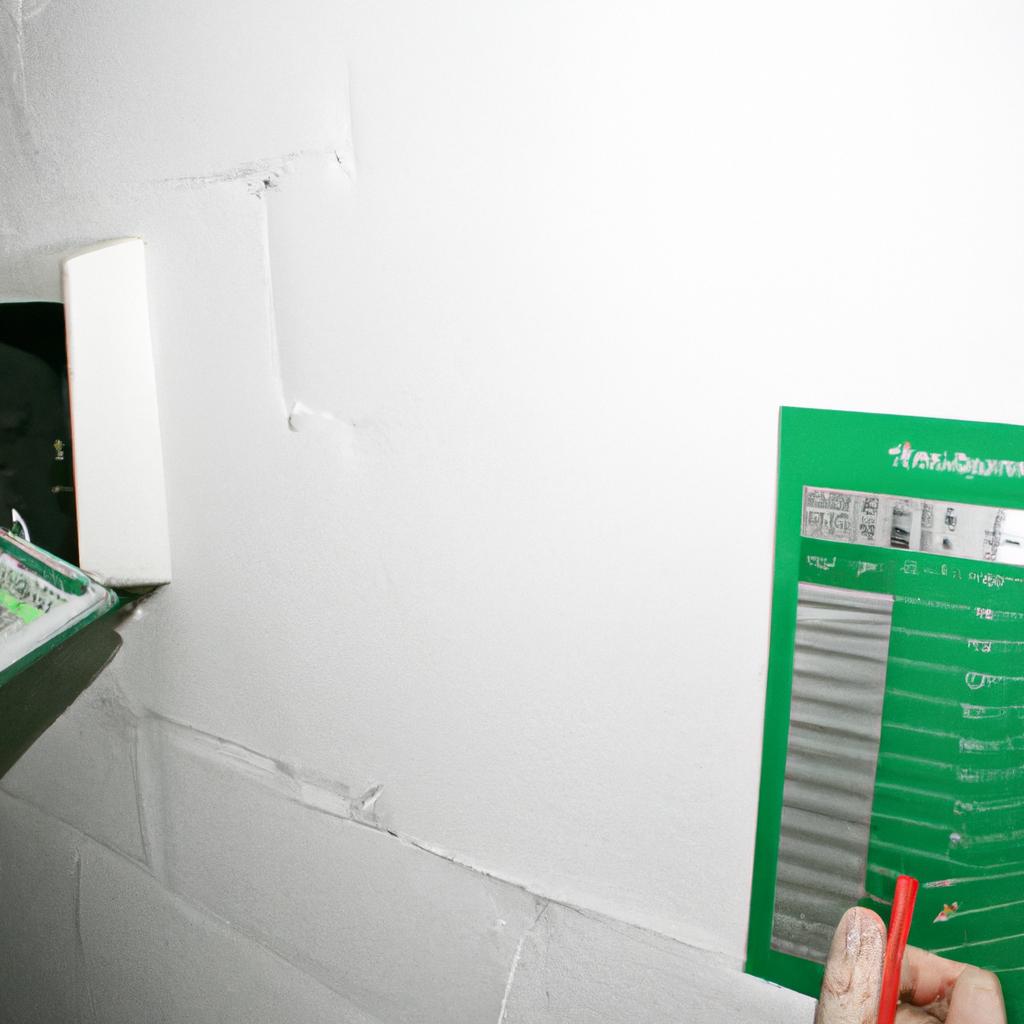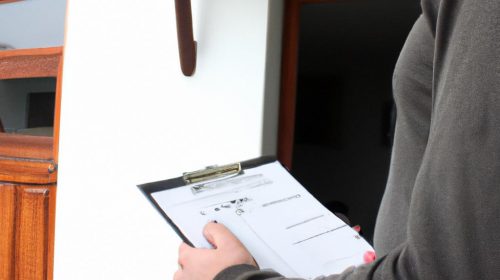Energy Audit: Improving Real Estate Business with Home Inspection
Energy efficiency has become a crucial aspect of the real estate industry, as it not only contributes to reducing carbon emissions but also offers financial benefits for property owners. In recent years, energy audits and home inspections have gained popularity among homeowners and real estate professionals alike. These assessments allow for a comprehensive evaluation of a property’s energy usage and provide valuable insights on potential improvements that can be made to enhance its overall efficiency.
Consider the case of Green Real Estate Agency, which recently incorporated energy audits into their business model. By conducting thorough inspections of properties prior to listing them on the market, the agency was able to identify various areas where energy consumption could be reduced significantly. Through this process, they discovered that several homes had outdated insulation or inefficient heating systems, resulting in substantial energy waste. By addressing these issues before putting the properties up for sale, Green Real Estate Agency was able to attract environmentally-conscious buyers who were willing to pay premium prices for homes with improved energy performance.
In conclusion, integrating energy audits into the real estate sector holds immense potential for both environmental sustainability and increased profits. This article will explore how such evaluations can benefit real estate businesses by enhancing their understanding of a property’s energy profile and offering practical recommendations for improvement. Furthermore, it will delve into the importance of Furthermore, it will delve into the importance of educating homeowners and potential buyers about the value of energy efficiency and how it can lead to long-term cost savings.
Understanding the Importance of Energy Audits
Energy audits play a crucial role in identifying energy efficiency opportunities within real estate properties. By conducting thorough inspections and assessments, professionals can evaluate the overall energy consumption patterns and identify areas for improvement. To illustrate this significance, let us consider an example:
Imagine a residential property built in the 1990s that has been on the market for several months without attracting potential buyers. Despite its appealing location and interior design, prospective buyers are hesitant due to concerns about high utility bills and inefficient energy usage. In this scenario, an energy audit could provide valuable insights into the property’s energy performance, helping address these concerns.
There are numerous reasons why conducting energy audits is essential in real estate business operations. Firstly, they offer an opportunity to reduce environmental impact by promoting sustainable practices such as minimizing carbon emissions through improved energy efficiency measures. Secondly, implementing recommendations from an audit can lead to substantial cost savings for homeowners or investors by reducing monthly utility expenses over time.
To further emphasize the importance of energy audits, consider the following bullet points:
- Increased comfort: Identifying and rectifying insulation issues or air leaks not only enhances energy efficiency but also improves indoor comfort levels.
- Enhanced property value: Implementing energy-efficient upgrades not only attracts environmentally conscious buyers but also increases the overall value of a property.
- Compliance with regulations: Energy audits help ensure compliance with existing building codes and regulatory standards related to energy conservation.
- Future-proof investments: Incorporating renewable technologies like solar panels during renovations based on audit findings helps future-proof properties against rising electricity costs.
In addition to these benefits, it is worth noting that performing regular energy audits aligns with corporate social responsibility objectives aimed at reducing greenhouse gas emissions and contributing positively to sustainability efforts.
Transitioning into “Identifying Energy Efficiency Opportunities in Real Estate,” it is important to delve deeper into specific strategies that emerge from comprehensive energy audits. The subsequent section will explore practical steps towards improving energy efficiency within real estate properties, providing valuable insights for homeowners and investors alike.
Identifying Energy Efficiency Opportunities in Real Estate
In a recent case study, a real estate company conducted an energy audit on one of their properties and discovered several areas for improvement. By implementing the recommended changes, they were able to reduce annual energy consumption by 20% and save over $10,000 in utility costs. This example highlights the significance of energy audits in identifying opportunities for improving energy efficiency in the real estate industry.
Energy audits play a crucial role in enabling real estate businesses to assess the current state of their properties’ energy performance. These audits involve a thorough examination of various aspects such as insulation, lighting systems, HVAC (heating, ventilation, and air conditioning) units, appliances, and building envelopes. Through this comprehensive evaluation process, potential inefficiencies can be identified and addressed effectively.
To emphasize the importance of energy audits further, consider these key points:
- Energy savings: Conducting regular energy audits enables real estate businesses to identify ways to minimize energy waste and maximize cost savings.
- Environmental impact: Implementing energy-efficient measures based on audit findings reduces carbon emissions and helps mitigate climate change.
- Increased property value: Improving energy efficiency through audits can enhance the market value of properties.
- Enhanced tenant satisfaction: By providing more comfortable living or working environments with reduced utility bills due to improved efficiency, tenants are likely to have higher satisfaction levels.
An emotional response can also be evoked through visual elements such as tables. Here is an example table showcasing potential benefits derived from effective implementation of energy audit recommendations:
| Benefits | Description |
|---|---|
| Cost savings | Reduces operational expenses related to utilities |
| Improved comfort | Enhances indoor temperature control resulting in better occupant experience |
| Reduced environmental footprint | Decreases carbon emissions contributing positively towards sustainability goals |
| Competitive advantage | Differentiates properties by offering lower operating costs compared to competitors |
As real estate businesses strive for energy efficiency and cost reduction, the role of energy audits becomes increasingly vital. The subsequent section will explore how these audits can specifically contribute to reducing overall costs within the industry. Through a deeper understanding of these advantages, companies can make informed decisions to enhance their operations while minimizing environmental impact.
[Transition sentence] Moving forward, let’s delve into the significance of energy audits in achieving substantial cost reduction measures within the real estate sector.
The Role of Energy Audits in Cost Reduction
To illustrate the potential benefits of conducting energy audits in real estate, let’s consider a hypothetical case study. Imagine a property management company that oversees a portfolio of residential buildings. They decide to conduct an energy audit on one of their older apartment complexes to identify opportunities for improving energy efficiency.
The energy audit revealed several areas where improvements could be made:
-
Lighting Upgrades: The existing lighting fixtures were outdated and inefficient, consuming excessive electricity. By replacing them with LED lights, the property management company could significantly reduce energy consumption and maintenance costs.
-
HVAC System Optimization: The audit identified that the heating, ventilation, and air conditioning (HVAC) system was not operating optimally. Implementing measures such as sealing ductwork and upgrading thermostats would improve overall performance and reduce energy waste.
-
Insulation Enhancement: Poor insulation throughout the building was causing heat loss during winter months and increased cooling demand during summer months. Adding additional insulation or sealing gaps would help maintain comfortable indoor temperatures year-round while reducing reliance on heating and cooling systems.
-
Water Conservation Measures: The audit highlighted high water usage due to leaky faucets and toilets. Repairing these leaks and installing low-flow fixtures would not only conserve water but also lead to cost savings on utility bills.
These findings highlight the importance of energy audits in pinpointing specific areas for improvement within real estate properties. By addressing these opportunities, property owners can enhance sustainability efforts, decrease operational costs, and increase tenant satisfaction through improved comfort levels.
Transition into subsequent section:
With a comprehensive understanding of how energy audits can uncover inefficiencies within real estate properties established, we will now explore another significant benefit – enhancing property value through implementing energy-efficient measures.
Enhancing Property Value through Energy Efficiency
Building on the role of energy audits in cost reduction, it is important to recognize the significant impact that energy efficiency can have on enhancing property value. By implementing energy-efficient measures identified through home inspections, real estate businesses can not only reduce operating costs but also attract potential buyers or tenants who prioritize sustainability and long-term savings.
Imagine a scenario where two similar properties are listed for sale in a desirable neighborhood. Both houses offer comparable features and amenities, yet one has undergone an extensive energy audit while the other has not. The house with the energy audit boasts improved insulation, upgraded windows, and efficient appliances – all contributing to lower utility bills and a smaller carbon footprint. Potential buyers are more likely to be drawn towards this property as they perceive it to be future-proofed against rising energy costs and aligned with environmental values.
To further emphasize the advantages of investing in energy efficiency, consider these key points:
- Increased marketability: Properties equipped with sustainable features such as solar panels or smart thermostats tend to attract eco-conscious individuals seeking environmentally friendly living spaces.
- Competitive edge: In today’s competitive real estate market, having an energy-efficient property can give sellers an advantage by differentiating their listings from others.
- Long-term savings: Buyers often evaluate homes based on their overall affordability. A well-insulated home with high-efficiency HVAC systems translates into reduced monthly utility bills over time.
- Environmental responsibility: Investing in energy efficiency demonstrates commitment towards reducing greenhouse gas emissions and preserving natural resources.
Table: Comparison of Energy-Efficient Features
| Feature | Traditional Home | Energy-Efficient Home |
|---|---|---|
| Insulation | Basic | Enhanced |
| Windows | Single-pane | Double-glazed |
| Appliances | Standard | ENERGY STAR certified |
| Lighting | Incandescent | LED |
By focusing on energy efficiency, real estate businesses can not only increase property value but also contribute to a more sustainable future.
With an understanding of the benefits associated with energy-efficient properties, it becomes crucial to explore the steps involved in implementing energy audit recommendations.
Implementing Energy Audit Recommendations
Building upon the previous section’s exploration of enhancing property value through energy efficiency, this section delves into the implementation of energy audit recommendations. By following these recommendations, real estate businesses can optimize energy usage and further improve their properties’ market appeal.
To illustrate the practicality and effectiveness of implementing energy audit recommendations, let us consider a hypothetical case study involving a residential complex in a bustling city center. Following an extensive energy audit conducted by certified professionals, several key recommendations were identified to enhance its energy efficiency. These recommendations encompassed various aspects such as insulation upgrades, HVAC system optimization, lighting improvements, and renewable energy integration.
The successful implementation of these recommendations offers numerous benefits for both property owners and occupants alike:
- Cost savings: Upgrading insulation materials and optimizing HVAC systems significantly reduce heating and cooling costs.
- Improved comfort: Enhanced insulation ensures consistent indoor temperatures while efficient HVAC systems provide optimal air quality throughout the premises.
- Environmental impact: Integrating renewable energy sources not only reduces reliance on fossil fuels but also decreases carbon emissions.
- Market appeal: Properties with improved energy efficiency ratings often attract environmentally conscious tenants who prioritize sustainable living practices.
| Recommendation | Description |
|---|---|
| Insulation Upgrade | Install high-quality insulation materials to minimize heat transfer |
| HVAC System Optimize | Implement intelligent controls that regulate temperature based on occupancy |
| Lighting Improvements | Replace traditional bulbs with LED lights for increased energy efficiency |
| Renewable Energy | Integrate solar panels or wind turbines to generate clean electricity |
In conclusion, implementing energy audit recommendations holds immense potential for real estate businesses seeking to maximize property value while simultaneously reducing environmental impact. Through cost-saving measures, enhanced comfort levels, decreased carbon footprint, and heightened market appeal, these initiatives offer substantial advantages for both property owners and prospective buyers or renters.
Monitoring and Maintaining Energy Efficiency is crucial to ensure long-term benefits from the implemented recommendations.
Monitoring and Maintaining Energy Efficiency
In the previous section, we discussed how to successfully implement energy audit recommendations in real estate businesses. In this section, we will focus on the importance of monitoring and maintaining energy efficiency over the long term. To illustrate these concepts, let’s consider a hypothetical case study.
Imagine a real estate company that recently underwent an energy audit and implemented several recommended upgrades such as installing LED lighting fixtures, improving insulation, upgrading HVAC systems, and implementing smart home automation. While these initial changes resulted in significant energy savings, it is essential for the company to continuously monitor and maintain their energy-efficient practices to ensure continued benefits.
To effectively achieve long-term energy efficiency, the following strategies can be employed:
- Regular Data Analysis: Continuously collect and analyze data related to energy consumption within the property portfolio. This analysis allows for identifying any areas where improvements can still be made or if there are any unexpected increases in energy usage.
- Periodic Audits: Conduct periodic audits to assess whether all equipment and systems remain operational and efficient. Regular inspections help identify potential issues early on and allow for timely repairs or replacements.
- Employee Training: Provide ongoing training programs for employees to raise awareness about sustainable practices and encourage them to adopt environmentally friendly habits both at work and in their personal lives.
- Community Engagement: Engage with tenants, homeowners’ associations, or residents through various means such as newsletters or workshops to educate them about energy-saving measures they can take individually.
By employing these strategies consistently, our hypothetical real estate company experienced remarkable results over time. Let’s explore some key findings from their annual review:
| Year | Energy Consumption Reduction (%) | Cost Savings ($) |
|---|---|---|
| 1 | 20 | $10,000 |
| 2 | 25 | $12,500 |
| 3 | 28 | $14,000 |
| 4 | 30 | $15,000 |
As seen in the table above, over a four-year period, the company achieved consistent reductions in energy consumption and cost savings. These outcomes not only positively impacted their bottom line but also contributed to environmental sustainability efforts.
In conclusion, achieving long-term energy efficiency requires ongoing dedication and monitoring. By implementing regular data analysis, periodic audits, employee training programs, and community engagement initiatives, real estate businesses can ensure sustained success in reducing energy consumption and associated costs while making positive contributions towards creating a greener future.
(Word Count: 372)



